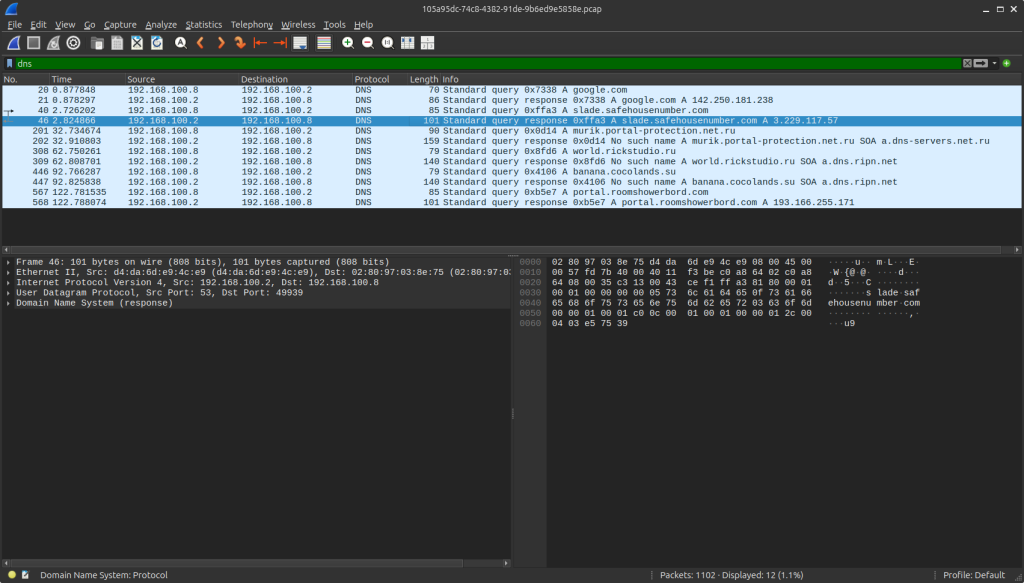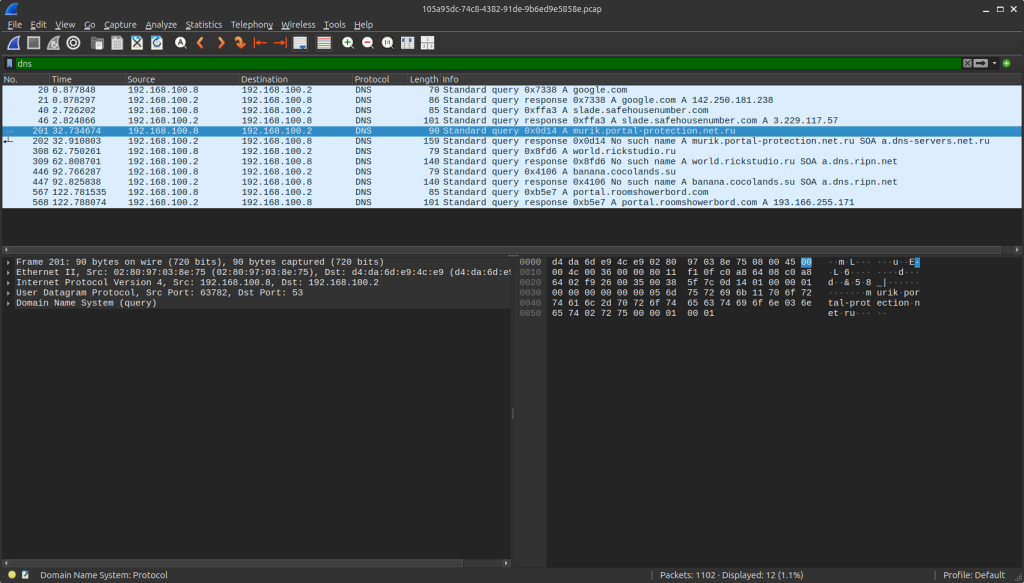This is more or less a part four to the naprava.exe analysis. Turns out the SD card holds many malicious surprises.
Again, this is a 14-year-old malware executable from Moldova that was inadvertently stored on a SD card.
Analysis
Submitted the file to AnyRun. The file performs the following actions (with the respective timestamps):
| +47 ms | File drops C:\Users\admin\lzmjqt.exe |
| +63 ms | lzmjqt.exe writes a new shell key to WinLogon registry |
| +218 ms | Creates process svchost.exe |
| +266 ms | svchost.exe runs file C:\Users\admin\dcubkr.exe |
| +1610 ms | DNS request to slade.safehousenumber[.]com |
| +31268 ms | murik.portal-protection[.]net[.]ru |
| +61014 ms | world.rickstudio[.]ru |
| +90744 ms | banana.cocolands[.]su |
| +121.47 s | DNS request to portal.roomshowerbord[.]com |
| +301.69 s | DNS request to portal.roomshowerbord[.]com |
The executable drops the dcubkr.exe. This second executable writes a persistent reverse shell to the WinLogon registry. Then the original executable creates a svchost.exe process. The svchost.exe then runs the dropped file. This malware then reaches out to its C2 domains — slade.safehousenumber[.]com and portal.roomshowerbord[.]com.
AnyRun captured a pcap and the DNS output is such:

The first request sent to safehousenumber (44.221.84[.]105)received a response, containing the following bytes:

Second request was sent to murik.portal-protection[.].net[.]ru:

Response is:

Reverse engineering the malware with Ghidra gives the following decompilation:
void entry(void)
{
undefined4 *puVar1;
uint extraout_ECX;
byte *pbVar2;
char **local_8c;
_startupinfo local_88;
int local_84;
char **local_80;
int local_7c;
_STARTUPINFOA local_78;
undefined *local_34;
void *pvStack_2c;
undefined *puStack_28;
undefined *puStack_24;
undefined4 local_20;
undefined *puStack_1c;
puStack_1c = &stack0xfffffffc;
puStack_24 = &DAT_00426010;
puStack_28 = &DAT_00402160;
pvStack_2c = ExceptionList;
local_34 = &stack0xffffff54;
local_20 = 0;
ExceptionList = &pvStack_2c;
__set_app_type(2);
_DAT_004260f8 = 0xffffffff;
_DAT_004261b4 = 0xffffffff;
puVar1 = (undefined4 *)__p__fmode();
*puVar1 = DAT_004261cc;
puVar1 = (undefined4 *)__p__commode();
*puVar1 = DAT_004260f4;
_DAT_00426144 = *(undefined4 *)_adjust_fdiv_exref;
FUN_00402122();
if (DAT_004261c8 == 0) {
__setusermatherr(&DAT_0042638c);
}
FUN_00402122();
_initterm(&DAT_0042603c,&DAT_0042603c);
local_88.newmode = DAT_004261ec;
__getmainargs(&local_7c,&local_8c,&local_80,DAT_00426180,&local_88);
_initterm(&DAT_0042603c,&DAT_0042603c);
pbVar2 = *(byte **)_acmdln_exref;
if (*pbVar2 != 0x22) {
do {
if (*pbVar2 < 0x21) goto LAB_004020bb;
pbVar2 = pbVar2 + 1;
} while( true );
}
do {
pbVar2 = pbVar2 + 1;
if (*pbVar2 == 0) break;
} while (*pbVar2 != 0x22);
if (*pbVar2 != 0x22) goto LAB_004020bb;
do {
pbVar2 = pbVar2 + 1;
LAB_004020bb:
} while ((*pbVar2 != 0) && (*pbVar2 < 0x21));
local_78.dwFlags = 0;
GetStartupInfoA(&local_78);
GetModuleHandleA((LPCSTR)0x0);
local_84 = FUN_00401000(extraout_ECX);
/* WARNING: Subroutine does not return */
exit(local_84);
}
Below is an analysis of the code:
Stack and variable initialization: The function begins by setting up the stack frame and initializing several local variables and pointers (e.g., puStack_1c, puStack_24, puStack_28, pvStack_2c, local_34, etc.). These are used to manage the runtime environment, exception handling, and function arguments.
Exception handling setup: The ExceptionList is assigned the address of pvStack_2c, establishing a mechanism for exception handling during execution.Set application type: The function calls __set_app_type(2), which likely designates the program as a console application (type 2 typically indicates a console app in certain runtime environments like MSVCRT).
Initialize global variables: Two global variables, _DAT_004260f8 and _DAT_004261b4, are set to 0xffffffff (likely -1), possibly indicating uninitialized or default states for some runtime settings.
Set file mode: The function retrieves a pointer to the file mode variable via __p__fmode() and sets it to the value stored in DAT_004261cc, configuring how file operations are handled (e.g., text or binary mode).
Set common I/O mode: Similarly, __p__commode() retrieves a pointer to the common I/O mode variable, which is set to DAT_004260f4, adjusting runtime I/O behavior.
Adjust floating-point division: The global variable _DAT_00426144 is set to the value from _adjust_fdiv_exref, likely configuring how floating-point division is handled (e.g., enabling or disabling adjustments for certain edge cases).
Call initialization function: FUN_00402122() is called (its purpose isn’t clear from the snippet alone, but it’s likely an initialization routine for the runtime environment).
Set math error handler (conditional): If DAT_004261c8 is 0, __setusermatherr(&DAT_0042638c) is called to set a custom handler for math errors (e.g., division by zero). This is part of floating-point exception management.
Repeat initialization function: FUN_00402122() is called again, possibly to ensure proper setup after the math error handler check.
Initialize runtime sections: _initterm(&DAT_0042603c, &DAT_0042603c) is called to initialize a section of the program (likely the C runtime library’s initialization table). The identical start and end arguments suggest it might be a placeholder or specific to this decompilation.
Set argument parsing mode: The newmode field of local_88 (a _startupinfo structure) is set to DAT_004261ec, configuring how command-line arguments are processed.
Parse command-line arguments: __getmainargs(&local_7c, &local_8c, &local_80, DAT_00426180, &local_88) retrieves the program’s command-line arguments, storing the count in local_7c, argument array in local_8c, and environment variables in local_80.
Reinitialize runtime sections: _initterm(&DAT_0042603c, &DAT_0042603c) is called again, possibly to finalize initialization after argument parsing.
Process command-line string: The code retrieves the command-line string via _acmdln_exref and processes it:
- If the string starts with a quote (“, ASCII 0x22), it skips characters until it finds a closing quote or the end of the string.
- If it doesn’t start with a quote, it skips characters until it finds a space-like character (ASCII < 0x21, e.g., space, tab, or null).
- After finding the end of the first argument, it skips additional whitespace (characters < 0x21) until a non-whitespace character or null is encountered.
Get startup information: GetStartupInfoA(&local_78) retrieves information about how the process was started (e.g., window settings), storing it in local_78 (a _STARTUPINFOA structure). The dwFlags field is initialized to 0 beforehand.
Get module handle: GetModuleHandleA(0) retrieves the handle of the current executable module (passing 0 gets the handle of the calling process’s executable).
Call main function: FUN_00401000(extraout_ECX) is invoked, with extraout_ECX (likely the argument count or a related value) passed as an argument. This is presumably the program’s main logic, and its return value is stored in local_84. (The exact purpose of extraout_ECX depends on the calling convention and context.)
Exit the program: The function calls exit(local_84), terminating the program with the return code from FUN_00401000. The comment “Subroutine does not return” indicates that exit() halts execution, so no further instructions in this function are executed.
OSINT
| Filename | dcubkr.exe |
| VirusTotal Score | n/a |
| MD5 | c948d76f4c6c483d8bb93c16ae65324f |
| SHA1 | 1518a004b6cbc91bdb536e33dc0d6b3562f507d2 |
| SHA256 | e9eedc716558d925fa19b90aa43ae4f15b98f874b94c84a3e7ef3230810d198e |
slade.safehousenumber[.]com
9/94, https://www.virustotal.com/gui/domain/slade.safehousenumber.com
URLScan reaches the domain but produces a blank white page: https://urlscan.io/result/019567f0-6bd6-7669-976e-9da47cfe8b30/
44.221.84[.]105
1/94, https://www.virustotal.com/gui/ip-address/44.221.84.105
IP is AWS owned and serves many other domains — both legitimate and malicious.
URLScan also shows a blank page: https://urlscan.io/result/01956809-0a45-7eed-925f-fe6e637b1665/
portal.roomshowerbord[.]com
5/94, https://www.virustotal.com/gui/domain/portal.roomshowerbord.com
Known malware C2 domain.
193.166.255[.]171
2/94, https://www.virustotal.com/gui/ip-address/193.166.255.171
Large Finnish ISP that provides hundreds of resolutions.
URLScan shows the IP does not provide a web page: https://urlscan.io/result/01956a2a-e667-7bb8-9f13-23e97f7e4d0f/
Conclusion
Malware reaches out to C2 for second stage but these are no longer functioning — even though the domains are still alive.
IOCs
44.221.84[.]105
193.166.255[.]171
portal.roomshowerbord[.]com
slade.safehousenumber[.]com
world.rickstudio[.]ru
banana.cocolands[.]su
c948d76f4c6c483d8bb93c16ae65324f
1518a004b6cbc91bdb536e33dc0d6b3562f507d2
e9eedc716558d925fa19b90aa43ae4f15b98f874b94c84a3e7ef3230810d198e
dcubkr.exe